The Best Product Content Syndication Platforms for 2025
Content Syndication
Updated on September 10, 2025
Ever wonder how brands get their high-quality videos on the product pages at the biggest retailers in the world?
This is made possible by a new take on an old innovation called product content syndication.
Historically, the syndication process was time-consuming, involving manual work, spreadsheets, and long email chains. But now, this can be automated with product content syndication platforms.
This article takes a deep dive into the concept of syndication and the different types of e-commerce content syndication platforms, and it provides a list of the best e-commerce syndication providers.
But first, read on to understand the role content syndication plays in the e-commerce world.
What are Product Content Syndication Platforms?
Product content syndication platforms are designed to help e-commerce businesses boost their online presence, reach a broader audience, and drive sales.
Essentially, it’s sharing brand-generated content—like product descriptions, images, and specifications—across various sales channels, including third-party online marketplaces, e-commerce platforms, retailer websites, and social media.
The idea of syndication isn’t new; it originally referred to distributing content across different media channels, like television and radio.
However, in the digital age, syndication has taken on a new meaning. Now, you syndicate content across multiple marketing channels and many sites simultaneously.
E-Commerce marketing requires businesses to create compelling product content tailored to their target audience.
This content must be consistent and relevant across different platforms and include relevant information, descriptions, high-quality images, and important specifications.
Content syndication platforms streamline the process, making it easier to manage and sync content across various retailers and platforms.

How AEG/Electrolux Drives PDP Conversions with Review Videos & 3D
Free case study downloadTwo of the many benefits of product content syndication are its ability to improve the customer experience and enhance product communication.
With better product content management, brands can publish detailed product information across different platforms. This empowers customers to make informed decisions, building trust and confidence in their brand.
For retailers, product content syndication offers advantages too. They gain access to high-quality product content provided by brands, enhancing their product listings and attracting more customers. This leads to improved PDP UX which leads to more engagement, conversions, and sales revenue.
In summary, product content syndication is a valuable strategy for e-commerce businesses looking to expand their reach and drive sales.
Through syndication tools and third-party sales channels, brands can connect with new customers and strengthen their online presence in the competitive digital landscape.
Why is Product Content Syndication Important?
Syndicated content is crucial for e-commerce businesses for several reasons.
Firstly, it boosts brand visibility across diverse sales channels. Brands can their content marketing efforts to various retailers in real-time, which helps them reach a broader audience.
This is probably the most important point when it comes to explaining why a comprehensive syndication strategy pays off.
This means brands can reach target audiences beyond their websites, and share their high-quality content with the world.
Secondly, product syndication ensures consistency and accuracy of product information across different channels, which boosts audience engagement.
Syndication platforms help brands achieve uniformity in product descriptions, digital assets, and product data builds credibility and confidence among consumers, preventing confusion and mistrust.

Syndication offers many benefits to retailers, too. They gain access to high-quality content provided by brands, enhancing their product listings and attracting more customers.
This leads to increased engagement, higher conversion rates, and ultimately, more sales revenue.
In summary, syndicating content is a valuable strategy for e-commerce businesses looking to expand their reach and drive sales.
Moreover, syndication drives more traffic and improves search engine visibility. Distributing content to multiple platforms increases online visibility, making it easier for potential customers to find products.
Additionally, syndicated content helps leverage existing content, as using it across multiple distribution channels helps optimize costs and multiply ROI.
In conclusion, product content syndication is essential for e-commerce businesses seeking to maximize their online presence and drive sales.
How a Product Content Syndication Platform Works
Understanding how a product content syndication solution operates is essential for e-commerce businesses looking to streamline their marketing efforts effectively.
This type of software solution functions by centralising both digital asset management and distribution of product content across multiple sales channels, ensuring consistency and maximising visibility.
At its core, a syndication solution simplifies your ability to create and deliver great content. Businesses can create compelling product descriptions, images, and specifications tailored to their target consumers’ preferences.
These content pieces are then uploaded to the syndication network, where they are organised and optimised for distribution.
Syndication then facilitates the distribution of valuable content across various sales channels, including e-commerce websites, social media platforms, and affiliate networks.
Through integration with these channels, the syndication solution ensures that product content reaches a wide audience base, maximising exposure and driving referral traffic to other websites.

Additionally, syndication solutions offer analytics tools that provide insights into content performance and consumer engagement.
Your business can track metrics such as click-through rates, conversion rates, and sales revenue to evaluate the effectiveness of their syndication efforts and make data-driven decisions to optimise their strategies.
When to Invest in Product Content Syndication Platforms
Understanding the ideal moment to move to paid content syndication platforms is crucial for e-commerce professionals aiming to optimise their marketing efforts effectively.
These platforms offer a range of benefits, but finding the right time to make such an investment requires careful consideration of several key factors, including cost, reach, and content distribution workflows.
Product Content Syndication
with DemoUp Cliplister
PUBLISH CONTENT FASTER
Bring content live in minutes
ACHIEVE BRAND CONSISTENCY
With one-click content updates
MAKE MORE SALES
Increase add-to-cart rates up to 34%
If your current content creation process is hard or lacks uniformity, a platform helps streamline workflows and optimise content dissemination across various channels, thereby fostering efficiency and efficacy in marketing endeavours.
This proactive approach safeguards search engine optimisation (SEO) endeavours and bolsters rankings on search engine results pages (SERPs), positioning the brand favourably amidst stiff competition.
Moreover, businesses with a substantial presence on blogging platforms and social media networks should consider the strategic investment in content syndication platforms to maximise reach and engagement.

Types of Syndication Solutions Relevant for E-Commerce
In e-commerce, there are several different types of syndication tools you can use to deliver content to the point of sale. Each one differs slightly in how it works, and the type of product data it delivers from brands to retailers.
Product Media Syndication Tools
Product media syndication is the automatic distribution of product media like images, product videos, and 3D and augmented reality (AR) product models
A well-executed product media syndication strategy helps brands enable retailers to sell more of their products by providing retailers’ website users with great content designed to nudge people into converting on the product detail page (PDP).
Product Data Feeds
Product data feeds are files that contain all the information about the products that retailers, marketplaces, and other platforms use to display product listings to users.
They contain all associated specifications, EANs/SKUs, digital assets, and anything else that brands want retailers to display on their websites. In essence, the term product data covers all types of syndicated content, but data feeds are more specific.
Product Information Management (PIM) Software
Product Information Management (PIM) software provides a centralised repository for storing all product-related data, including descriptions, images, specifications, pricing, and more.
This centralisation optimises data management processes and ensures consistency across various channels and touchpoints.
With PIM, organisations can tailor product information for different marketing channels and formats, including websites, catalogues, social media, and mobile applications. This flexibility enables targeted marketing campaigns and personalised experiences for customers across various channels.
Customer Review Syndication
Customer reviews are possibly the most important part of content marketing for e-commerce businesses. This is one of the most effective forms of product communication. Reviews help your customers get unbiased opinions from users just like them.
But customer reviews aren’t the only type of reviews. Review videos have real product testers, influencers, and YouTubers provide their feedback on products as they use them.
⭐ Want to raise add-to-cart rates by up to 34%? Check out our review video production service!
Product Description Syndication
Product descriptions are one of the most crucial pieces of on-site content in terms of SEO rankings. Product descriptions with rich, optimised text help search engines better understand the context of product detail pages.
A syndication process helps you maintain consistent product descriptions across multiple channels and helps your retailers outrank the competition. This results in a win-win situation for all parties involved. Plus, customers will see the same story everywhere they go, resulting in heightened trust.
The Best Product Content Syndication Software
There are several product content syndication platforms you can use to get content where it needs to go. Luckily, several of our clients used to use other providers in the space, so keep reading to find out how they rank and the strengths and weaknesses of each.
1. DemoUp Cliplister – Best for Product Media Syndication
We know what you’re thinking – of course, you say you’re the best product content syndication software! But to simply declare ourselves the best and move on would not be fair to anyone.
Our goal is to help you find the best option for your business, so here’s what we have to offer brands and retailers alike.
DemoUp Cliplister – Product Content Syndication for Brands

Our product content syndication software for brands helps you get your e-commerce media like product videos, 3D models, and other content to the digital point of sale.
This makes content distribution easy, as you can publish to many sites all at once like retailers, marketplaces, and other different channels so you reach a broader audience.
Plus, unlike other content distribution tools, our software prominently places your product videos, 3D models, and other content above the fold on any retailer’s website. This means more people see your content, which results in more conversions and revenue.
DemoUp Cliplister – Product Content Syndication for Retailers
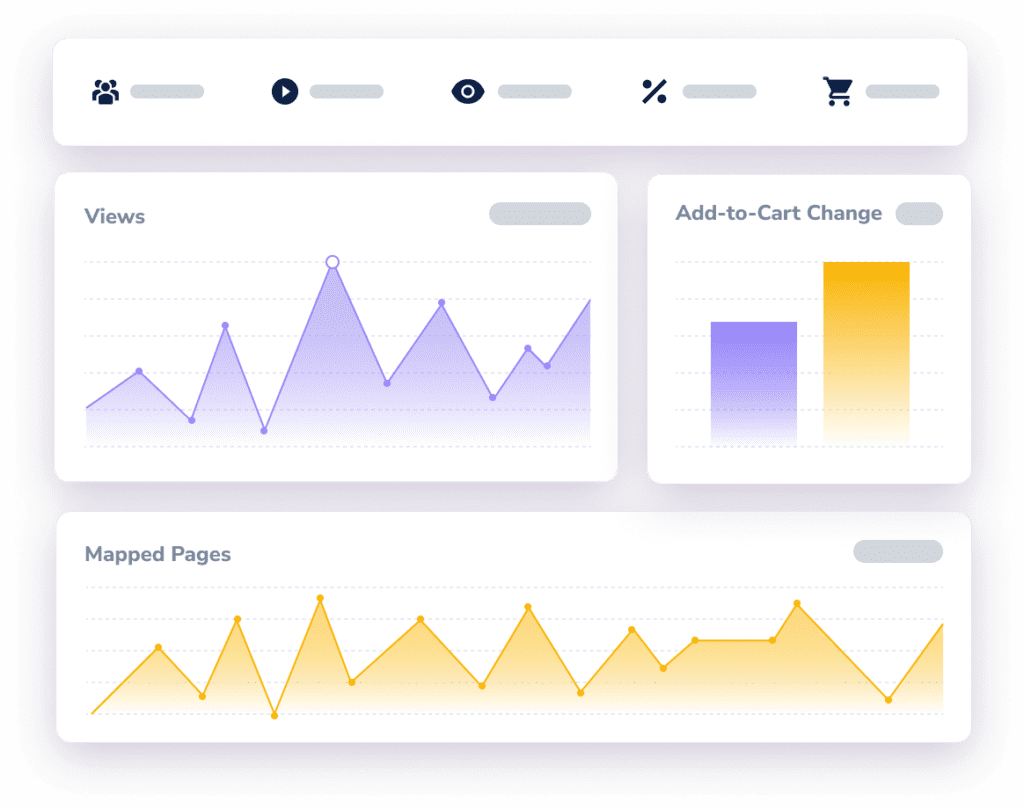
For retailers, joining the DemoUp Cliplister paid content syndication network helps you acquire, manage, and display brand-created content at scale. This removes strain on your teams, minimises the risk of errors, and ensures that you always have the most up-to-date content at your fingertips.
Note: Want to see example content? Click here to see the content you get.
2. Channel Pilot Pro – Best for Product Feed Management
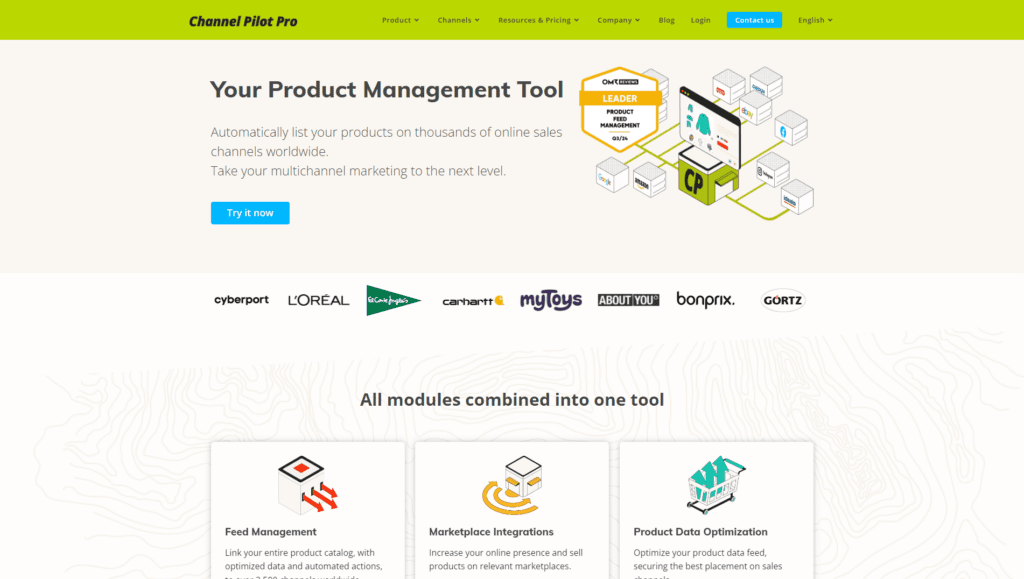
Channel Pilot Pro is a comprehensive e-commerce management solution designed to streamline and optimise online retail operations. The platform offers several tools to help businesses enhance their digital presence, manage multiple sales channels, and maximise their online sales potential.
Channel Pilot Pro features several integrations with various marketplaces, comparison shopping engines, and affiliate networks. This enables merchants to efficiently synchronise product data across multiple platforms, ensuring consistent and accurate listings.
One of the standout features of Channel Pilot Pro is its powerful product feed management capabilities. It allows users to create, customise, and optimise product feeds tailored to the specific requirements of different sales channels.
This improves product visibility and performance, ultimately driving higher conversion rates.
The platform also provides advanced analytics and reporting tools, offering valuable insights into sales performance, channel effectiveness, and market trends. These insights allow you to make data-driven decisions and fine-tune your strategies for better results.
Additionally, Channel Pilot Pro supports dynamic pricing, which helps you stay competitive by adjusting prices based on real-time market conditions and competitor analysis.
Overall, Channel Pilot Pro provides you a comprehensive platform for managing products across multiple channels.
3. Syndigo – Best for Product Information Management
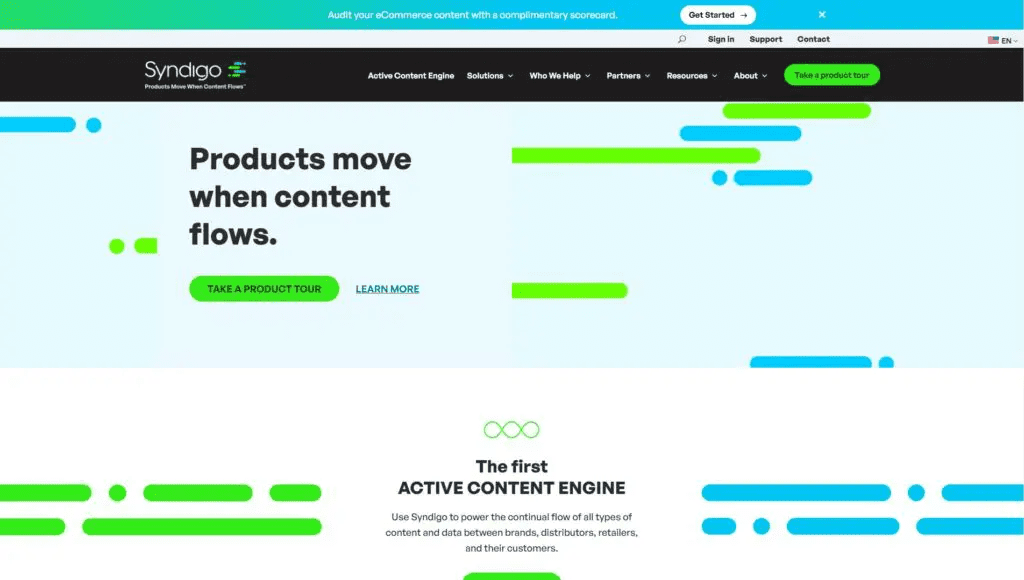
Syndigo is a leading product information management tool. It helps you create, optimise, and deliver product information to the digital point of sale.
Based in Chicago, Syndigo is one of the top options for brands and retailers looking to streamline their product information management processes.
However, it lacks visual syndicated content. Therefore, many of our clients will use us in combination with Syndigo. Get in touch if you want to know more about how we integrate with Syndigo.
Or, check out our article on Syndigo alternatives for a complete rundown of its pros and cons.
4. Flixmedia – Best for Content Enrichment
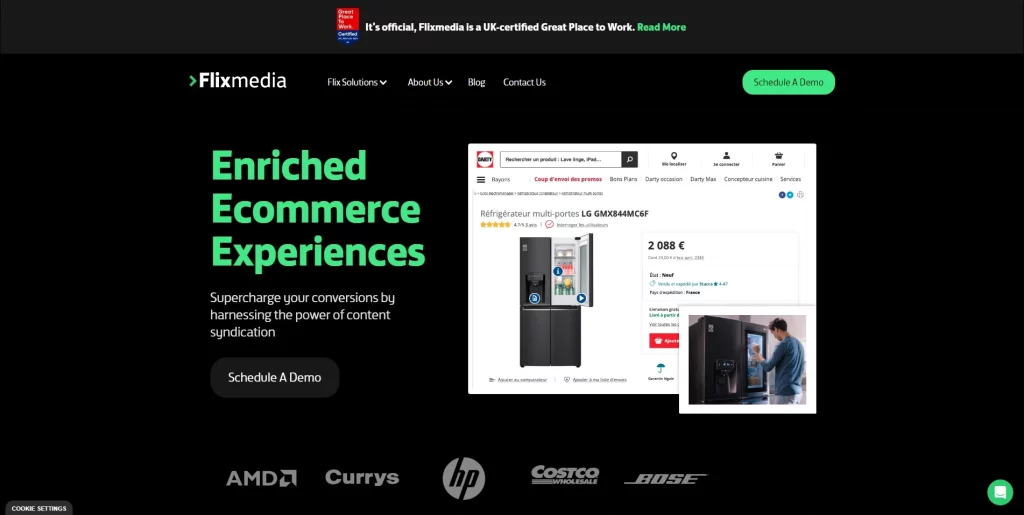
Content enrichment is hugely important for e-commerce. Flixmedia helps brands enable retail partners by providing them with media they can use to enrich their PDPs with hotspots, minipages, and INpages.
Like our content syndication solutions, Flixmedia helps you deliver consistent product presentations at scale.
However, there are several reasons people look for alternatives to Flixmedia. On the brand side, Flixmedia is very expensive. This is the primary complaint we hear from their former clients.
While Flixmedia is a free content syndication solution for retailers, the cost burden on brands is so great that coverage is very low and often not worth the hassle of integrating the solution.
This means that the retailers that do connect to the network need enhanced content coverage anyway, which leads many to use DemoUp Cliplister and Flixmedia together as part of a product experience management stack.
5. loadbee – Best for Product Data Syndication

loadbee is a content syndication platform that assists brands in distributing product data and other catalogue information to the digital point of sale. It aids brands in ensuring consistent text-based content below the fold across the retailer network.
As implied by the name, loadbee solely injects content into PDPs below the fold. This implies that high-end product media such as 3D, AR, and product videos require additional services (like ours).
Additionally, many retailers seek loadbee alternatives to enhance content coverage for more of their catalogues.
6. ProductsUp – Best for Product Data Mapping
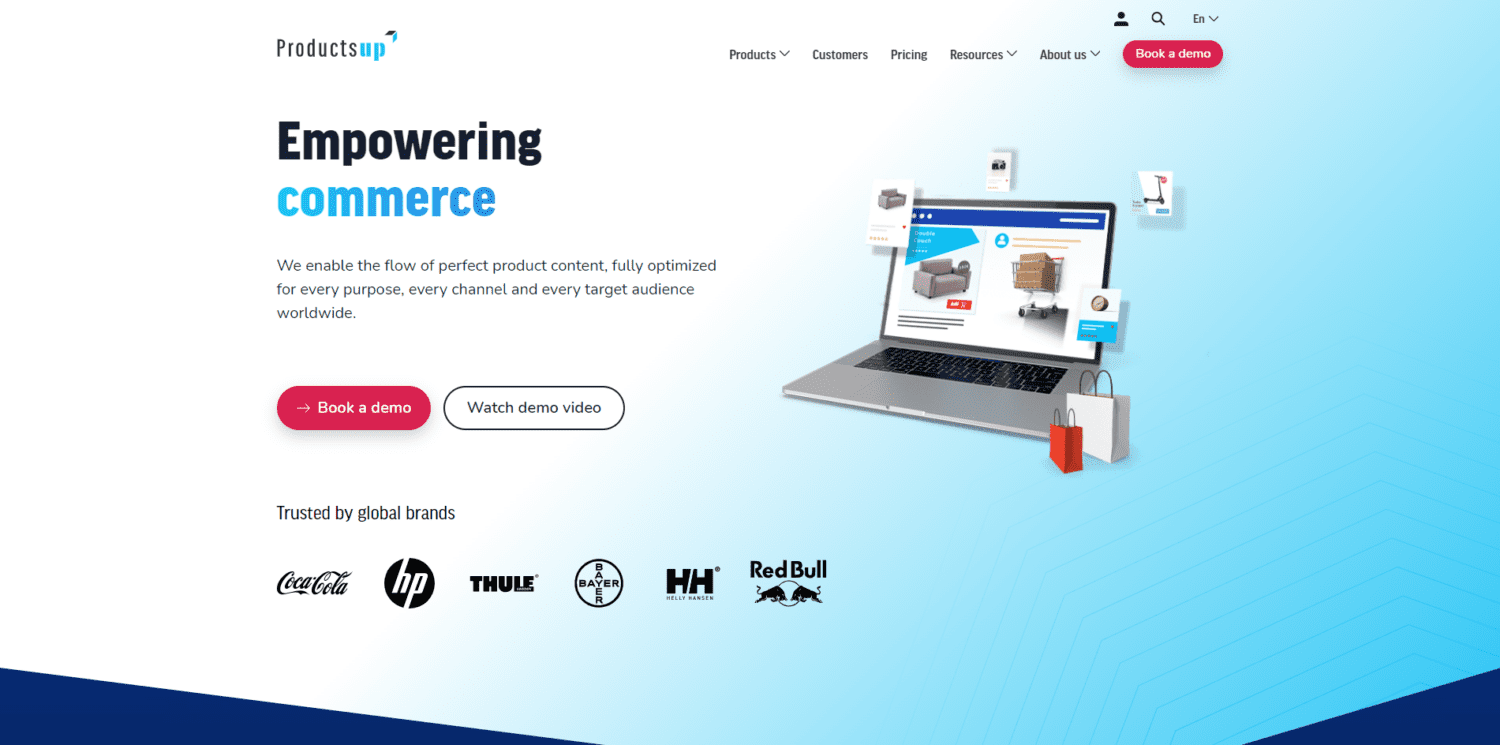
ProductsUp is a leading platform in the field of Product Information Management and Product Feed Management. It enables businesses to effectively manage, optimise, and distribute their product data across various channels and marketplaces.
Through ProductsUp, companies can streamline their e-commerce operations, improve data quality, and enhance their online visibility.
It provides tools for data mapping, enrichment, and syndication, empowering businesses to reach their target audiences more efficiently and drive better results in their online sales efforts.
However, if you’re looking for content syndication platforms to assist with visual content distribution, you’ll need to look elsewhere.
7. Salsify – Best for Digital Commerce Management
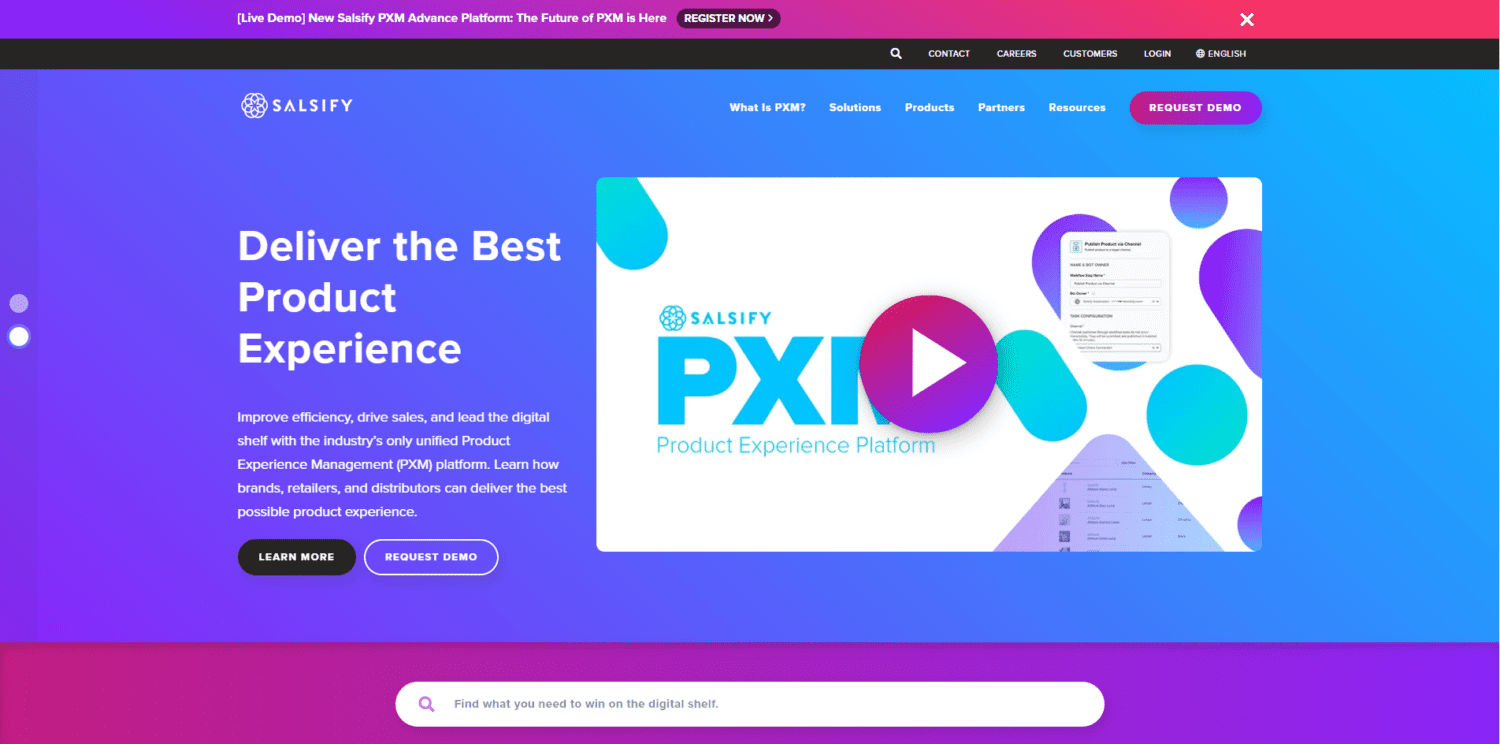
Salsify provides a comprehensive Product Experience Management (PXM) platform that centralises product content management, streamlining workflows for businesses. Its robust syndication capabilities enable seamless distribution of product content across multiple channels, enhancing online visibility.
The platform’s analytics and reporting features offer valuable insights into content performance, empowering businesses to make data-driven decisions.
However, despite its strengths, Salsify presents challenges for businesses with limited resources or technical expertise due to its complex implementation process and potentially high costs.
Integrating Salsify with existing systems and workflows can be time-consuming and may require additional investment in training and support.
Some users may find the platform’s interface overwhelming or difficult to navigate, especially without prior experience with Product Experience Management (PXM) solutions.
Furthermore, while Salsify offers robust analytics capabilities, accessing and interpreting data may require advanced analytical skills, limiting its usability for some users.
8. Plytix – Best for Managing Large Product Catalogues
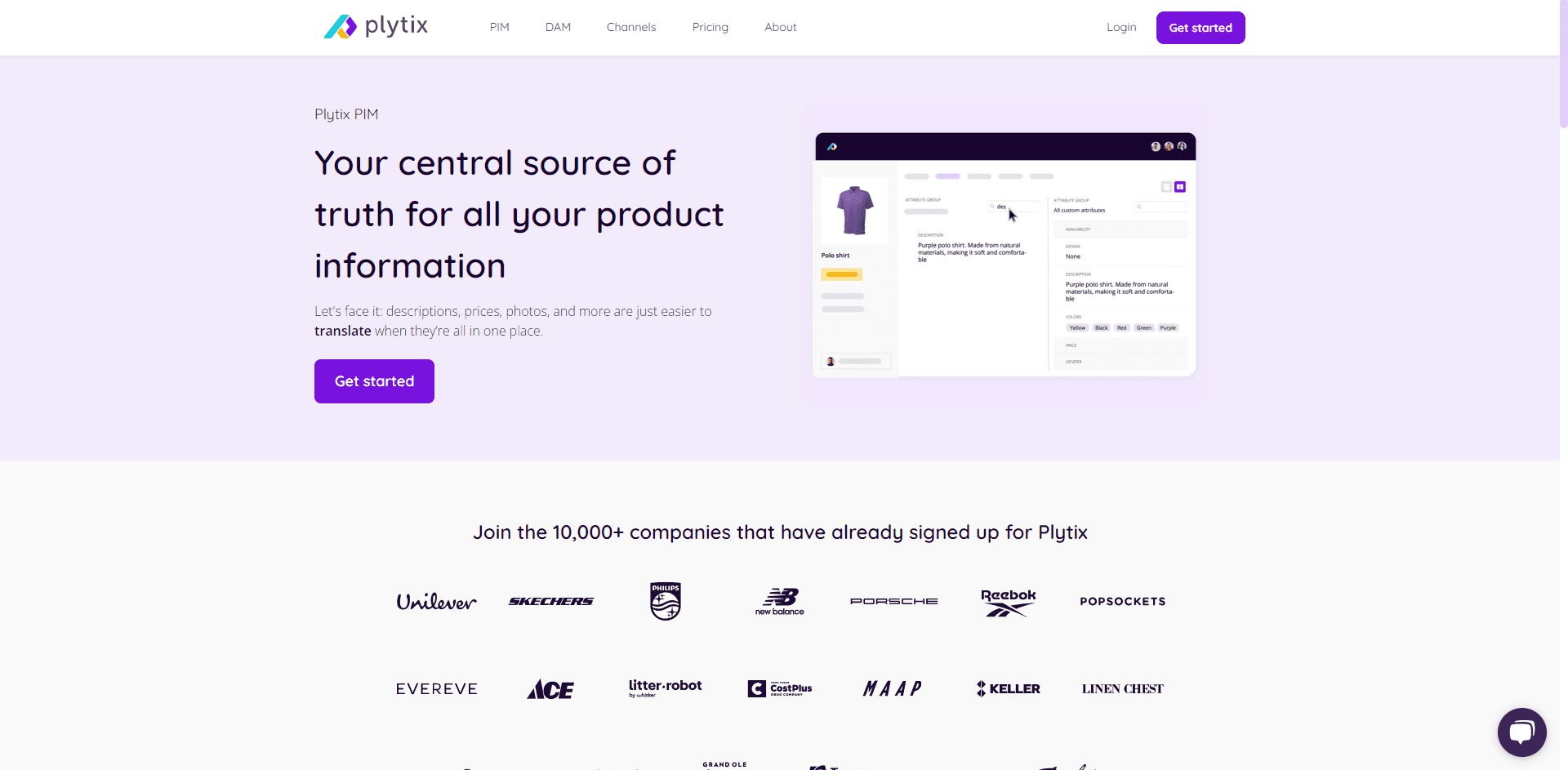
Plytix is a cloud-based Product Information Management (PIM) platform designed to assist businesses in efficiently managing and distributing product data.
It acts as a central repository for product information, allowing companies to organise, enrich, and distribute their product content across various sales channels.
Plytix offers features such as data import/export, product taxonomy management, digital asset management, and data enrichment tools.
Its goal is to streamline product content workflows, enhance data quality, and improve the online shopping experience for customers.
Plytix caters to a wide range of industries and businesses, from small startups to large enterprises, aiming to optimise their product information management processes.
Some potential drawbacks of Plytix include its interface, which some users may find less intuitive or visually appealing compared to other platforms.
Additionally, while Plytix offers a range of features for product information management, advanced functionalities may require additional customization or technical expertise to implement effectively.
Lastly, while Plytix caters to businesses of all sizes, smaller companies may find the pricing structure less flexible or prohibitive compared to alternative solutions.
9. Icecat – Best for Standardised Product Data

Icecat is a product content syndication platform designed to connect brands and retailers through the distribution of standardised product data and multimedia assets. By centralising content, it aims to simplify workflows and ensure consistency across e-commerce channels.
The platform offers a large library of ready-to-use product information, enabling businesses to enhance their online presence and deliver consistent product experiences. Its integration capabilities are designed to streamline processes and support global content distribution.
However, businesses with highly customised or niche product categories may need to invest extra effort to align with Icecat’s standardised formats. Additionally, companies new to content syndication may require initial time and resources to organise their data effectively.
Overall, Icecat is positioned as a scalable tool for managing and distributing product content efficiently, though it may require some setup and expertise to maximise its value.
👉 Check out our article on Icecat alternatives!
Wrapping Up
As you can see, the e-commerce syndication space gives you a lot of options. Marketers have many choices and it’s tough to know which tools will help your process and which are not relevant.
Plus, popular review sites struggle to classify product content syndication platforms, which can make it tough to find the information you need.
At the end of the day, it’s most important to use syndication platforms that help you create, manage, optimise, and syndicate product content from (or to) the brands and retailers most relevant to your business.
Whether you need an option that helps you manage product data or publish articles to a retailer’s site, there are plenty of choices out there.
Be sure to contact us to see how DemoUp Cliplister can help you with content distribution, streamline product syndication and accelerate your e-commerce growth.

Make Your Products Irresistable
See our high-quality content solutions for the digital point of sale.
Frequently Asked Questions
While we made our article as comprehensive as possible, sometimes our readers have additional questions. If you have any questions related to the topic of getting product content from one site to another, email us at contact@demoup-cliplister.com.
Consider ease of use, compatibility with your systems, support for various content types, analytics capabilities, and scalability to suit your business needs and growth.
Product syndication involves distributing brand-generated content like product descriptions and images across various sales channels, enhancing online visibility and reaching new customers effectively.
An example of content syndication is when a brand shares its product descriptions and images across multiple online platforms, such as retailer websites and social media channels.
DemoUp Cliplister stands out as the top choice for product media syndication because of its extensive network, prominent content placement, and proven effectiveness in boosting conversions.
DemoUp Cliplister is easy to integrate into any MarTech stack or existing workflow thanks to its developer-friendly and powerful API.
We offer a variety of products to help you with your syndication strategy. Therefore, we offer custom pricing based on your specific needs. Contact us for a customised quote.
Better Content. More Sales.

Fill out the form to discover our end-to-end eCommerce content solutions for brands & shops




